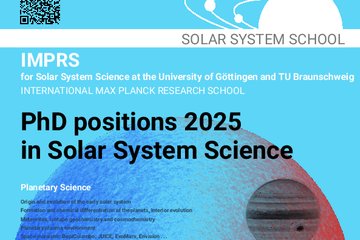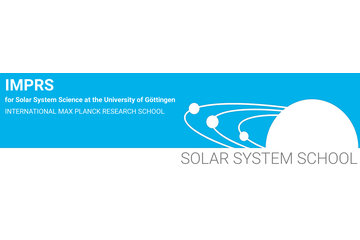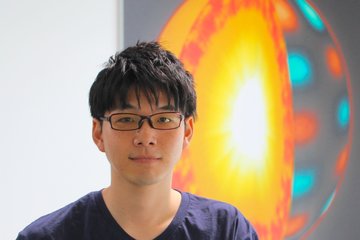Award-winning young researchers
In this year, three Otto Hahn Medals go to young researchers from Göttingen.
Scientists Yuto Bekki from the Max Planck Institute for Solar System Research as well as Ida Marie Astad Jentoft and Panagiotis Poulis from the Max Planck Institute for Multidisciplinary Sciences as have been awarded the Otto Hahn Medal for outstanding achievements in their dissertations. Jentoft is also honored with the Otto Hahn Award for the exceptional quality of her research. The Max Planck Society awarded the prizes at its annual meeting in Berlin on June 12.
Vibrating Sun
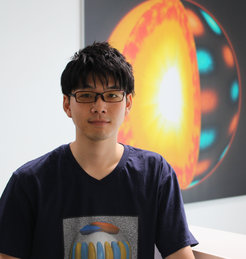
The Sun vibrates similar to a musical instrument. In addition to the Sun’s “high notes”, acoustic waves with periods of around five minutes, our star also exhibits “low notes”: oscillations with periods of around 27 days that are not acoustic in nature. Although these oscillations were theoretically predicted decades ago, researchers at the Max Planck Institute for Solar System Research have only recently detected them in observational data from NASA’s Solar Dynamics Observatory.
In his doctoral thesis, Yuto Bekki made a significant contribution to this discovery. The individual modes (or “notes”) of the long-period oscillations are distinguished by their exact oscillation period and by the pattern of their flow velocity on the solar surface. In his doctoral thesis, Yuto Bekki developed computer simulations to identify and characterize these modes. The Sun’s long-period oscillations contain information about its deep interior and can in the future help to better understand the processes there.
Yuto Bekki studied Physics at the University of Tokyo (Japan). Already during his bachelor’s thesis, he turned to questions of solar physics. The University of Tokyo honored his master’s thesis with the Academic Achievement Award. Yuto Bekki completed his doctorate at the University of Göttingen as part of the International Max Planck Research School on Solar System Science. His doctoral thesis has also already received two awards: the Division of Solar Physics of the European Physical Society presented Yuto Bekki the Patricia Edwin PhD Thesis Prize, the International Astronomical Union mentioned the thesis honorably.
Essential lattices
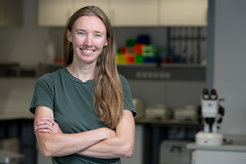
Life cannot begin without them: proteins. The egg cells of humans, and of all other mammals, therefore store essential proteins so that the embryo can draw on them during its development.
In her doctoral thesis, Ida Marie Astad Jentoft focused on how the required proteins are stored in egg cells. Egg cells are created in the ovaries of a female mammal from birth and remain functional there for months or even years. They have to keep their proteins in stock for a correspondingly long time without being degraded or becoming active at the wrong time. Jentoft discovered that so-called cytoplasmic lattices – thread-like structures in the cytoplasm – store the proteins. If the lattices were missing in an egg cell, no embryo could develop. Based on this new knowledge, Jentoft and her colleagues suggest that in the future reintroducing the necessary proteins could be a potential approach for women suffering from infertility caused by mutations in cytoplasmic lattice related genes.
Ida Marie Astad Jentoft studied molecular biomedicine at the University of Copenhagen (Denmark) and McGill University in Montreal (Canada). For her Master and subsequent PhD research, she joined the International Max Planck Research School for Molecular Biology in Göttingen. In 2023, Jentoft completed her PhD with Melina Schuh in the Department of Meiosis at the Max Planck Institute for Multidisciplinary Sciences. Since 2024, Jentoft has been working as a postdoc at the Institute for Molecular Pathology in Vienna (Austria). With the Otto Hahn Award, the molecular biologist can set up her own research group at a Max Planck Institute of her choice. This is the third time in a row that the MPS has presented an Otto Hahn Award to a young scientist who has completed a doctorate at the Max Planck Institute for Multidisciplinary Sciences.
Shifting frames
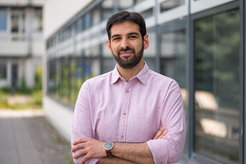
The ribosome is the protein factory of our cells. It synthesizes proteins from the mRNA templates, which perform important tasks in living cells. To do this, the ribosome recruits so-called tRNAs. They read nucleotides, which make up the mRNA in steps of three – the codons. Codon by codon, the tRNAs move along the mRNA and decode it. However, it can happen that the tRNAs are diverted from the reading rhythm; this process is known as recoding. Findings on recoding are relevant for research into cancer, neurodegenerative diseases, or the further development of mRNA vaccines, among other things.
In his doctoral thesis, Panagiotis Poulis investigated two recoding events. For that, he used single molecule microscopy, looking at one ribosome at a time: Firstly, he studied the so-called frameshifting of ribosomes on specific mRNA sequences, in which the reading frame of the mRNA code shifts. Secondly, he collaborated in experiments that showed how specific chemical modifications of the mRNA influence the decoding of mRNA information. For both processes, he was able to identify important underlying molecular mechanisms.
Panagiotis Poulis studied biology at the University of Athens (Greece) before joining the International Max Planck Research School for Molecular Biology in Göttingen. In 2022, Poulis completed his PhD in the Department of Physical Biochemistry of Marina Rodnina at the Max Planck Institute for Multidisciplinary Sciences. He is now working as a postdoc in the same department, researching recoding events in cancer and the influence of mRNA modifications in mRNA vaccines.
About the Otto Hahn Prizes
Since 1978, the Max Planck Society annually awards the Otto Hahn Medal to young researchers for exceptional scientific achievements and outstanding doctoral theses. The prize is endowed with 7,500 euros. With the Otto Hahn Award, the Max Planck Society honors particularly outstanding laureates by giving them the opportunity to lead a research group at an Max Planck Institute of their choice following their stay abroad. The award is intended to pave the way for a long-term scientific career in Germany.





